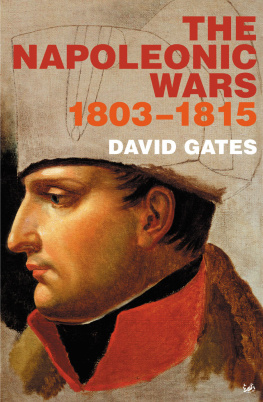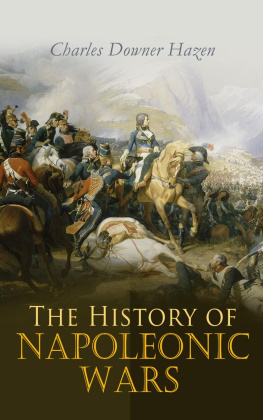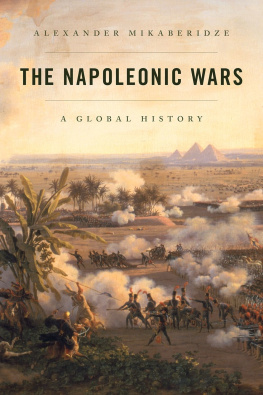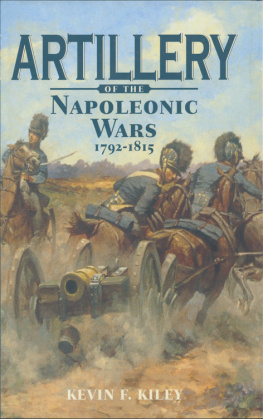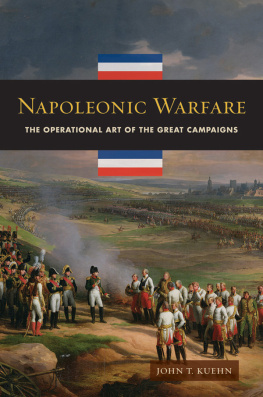David Gates - The Napoleonic Wars, 1803-1815
Here you can read online David Gates - The Napoleonic Wars, 1803-1815 full text of the book (entire story) in english for free. Download pdf and epub, get meaning, cover and reviews about this ebook. year: 2003, publisher: Pimlico, genre: History. Description of the work, (preface) as well as reviews are available. Best literature library LitArk.com created for fans of good reading and offers a wide selection of genres:
Romance novel
Science fiction
Adventure
Detective
Science
History
Home and family
Prose
Art
Politics
Computer
Non-fiction
Religion
Business
Children
Humor
Choose a favorite category and find really read worthwhile books. Enjoy immersion in the world of imagination, feel the emotions of the characters or learn something new for yourself, make an fascinating discovery.
- Book:The Napoleonic Wars, 1803-1815
- Author:
- Publisher:Pimlico
- Genre:
- Year:2003
- Rating:3 / 5
- Favourites:Add to favourites
- Your mark:
- 60
- 1
- 2
- 3
- 4
- 5
The Napoleonic Wars, 1803-1815: summary, description and annotation
We offer to read an annotation, description, summary or preface (depends on what the author of the book "The Napoleonic Wars, 1803-1815" wrote himself). If you haven't found the necessary information about the book — write in the comments, we will try to find it.
The Napoleonic Wars, 1803-1815 — read online for free the complete book (whole text) full work
Below is the text of the book, divided by pages. System saving the place of the last page read, allows you to conveniently read the book "The Napoleonic Wars, 1803-1815" online for free, without having to search again every time where you left off. Put a bookmark, and you can go to the page where you finished reading at any time.
Font size:
Interval:
Bookmark:

Contents
David Gates is Deputy Director and Senior Fellow of the Centre for Defence and International Security Studies at the University of Lancaster. He is the author of The Spanish Ulcer, a history of the Peninsular War (also available in Pimlico), and lives in Lancashire.

In May 1803, a little over ten years after Britain had first joined the war against Revolutionary France and just fourteen months after the conclusion of the Peace of Amiens, vessels of the Royal Navy fired the opening shots in what was to become the goriest, most expensive, wide-ranging and protracted armed conflict of the entire nineteenth century, the Napoleonic Wars. At this juncture, Britain lacked continental allies; and France, after a period of recuperation and reorganization, was more powerful and united than ever. Having put General Bonapartes protestations of peaceful intent to the test and found them wanting, however, Britain was resigned to renewing hostilities and maintaining them for as long as was necessary. She was to remain Napoleons most implacable foe until his final downfall some twelve years later.
Other states were to be less consistent in their behaviour, many of them changing sides in a succession of complex diplomatic manoeuvres, wars and customs unions. The three principal continental powers Austria, Prussia and Russia were all to spend periods as Napoleons allies, as were the Spaniards, Swedes and numerous lesser actors. Interstate conflict also spawned new or intensified existing internal divisions, notably in Spain and France itself, where various revolutionary and counter-revolutionary movements were to lock horns. Indeed, in many respects Napoleon was to reverse the changes wrought within France during the 1790s, most strikingly by returning her to enlightened despotism under an hereditary ruler. Though by no means unique to France, the sort of changes he made to her armed services and governmental machinery in particular went beyond anything found in any of the other leading states at this time. Not least because of the Revolutions legacy and the inability of both domestic and foreign adversaries to incommode him too seriously, between 1801 and 1805 especially, he was subject to fewer of the financial, strategic and political constraints that hampered innovators in Europes other major polities.
However, just as the exigencies of his wars notably conscription, requisitions, billeting, increased taxation in particular and economic sanctions in general alienated many of Napoleons subjects, so too did his programme of enlightened reform, much of which had the ulterior motive of tapping as much of his empires latent military potential as possible. If, in substituting absolutism for the litist parliamentary system of the Directory, he was supported by many within Frances military, political and propertied classes, his emphasis on order and legal rights at the expense of political liberties fuelled opposition both in France and further afield. Similarly, his penchant for dirigisme and the centralization of power might have enhanced French national unity and helped return the revolutionary genie to its bottle, but, like the reforms of earlier progressive monarchs, his imposition of values rooted in the reasoning of the Enlightenment was widely resented. This was not least because of the condescension and contempt that so many of the disciples of the Enlightenment evinced for the masses. With the rise of an administrative lite, the nucleus of which was located in Paris and which consisted of professional, educated, avuncular bureaucrats who were persuaded that they knew what was best for all, the Revolutionary ideals of open government and egalitarianism quickly faded.
This trend accounts for much of the popular opposition to Napoleon inside as well as outside France. It was not merely that, under him, France seemed to jeopardize the material interests and, in some cases, even the very existence of rival states, alarming enough though that was for their ruling dynasties and those who favoured a balance of power as a means of preserving peace. Many very ordinary people resented and resisted, sometimes passively, sometimes actively, the cultural assimilation that tended to accompany French military and diplomatic dominance. One exploiting tyrant is, after all, much the same as another; and, in a lot of respects, Napoleons imperial regime was indistinguishable from its counterparts in most of the polities that surrounded it. Few Europeans at this juncture possessed a developed sense of political consciousness, while notions of national identity, if in evidence at all, were essentially particularist loyalties derived from the ideologies and institutions of the old order, as in Britain and Spain. Nationalism of the kind that emerged much later in the nineteenth century was still in gestation, as was the concept of the nation-state, certainly in so far that the term would be generally understood today. Even prominent nationalists of the Napoleonic era, such as the German Johann Fichte, were for the most part far less interested in political unification than in the preservation of a broader, cultural sense of nationhood. Indeed, many Europeans touched by the Napoleonic empire feared that the notion of a nation-state had become synonymous with that of a centralized one.
This is part of the dilemma confronting the modern European Union, which largely grew out of a reaction to the awful trials and tribulations of the Second World War and is now at something of a crossroads in its development. Napoleons empire, too, was smelted in the forge of warfare. His almost ceaseless campaigns made him an absentee ruler who seldom made use of the numerous palaces at his disposal. For the day-to-day implementation of his policies, he had, perforce, to rely upon the administrative machine that, largely in the first five years of the nineteenth century, he established. If one leaves aside the exceptional and mostly short-lived military governments that arose in parts of occupied Spain, this was essentially a civilian administration with an ideology founded on the Enlightenments precepts. It was, moreover, one that, in France at least, continued to function even after the fall of his dynasty, just as so many of the polities he either founded or recast outlived him.
The First French Empire effectively divided into inner and outer spheres, and the degree to which peoples lives were affected by it varied appreciably. It was at its most successful and its legacy proved most enduring wherever the superiority of French culture and of the principles of the Enlightenment was acknowledged, if only by a ruling lite. This acceptance did not take place uniformly even in France itself. Elsewhere in northern Spain in 1810 and in the Kingdom of Holland the following year, for instance deviation from the Parisian grand plan led to annexation and the imposition of direct rule. In his dealings with defeated enemies on the fringes of his empire, by contrast, Napoleon often observed the old principle of legitimacy. So it was that Prussia was reduced to a minor power in the aftermath of Jena but not wiped from the map completely, any more than the humbled Habsburgs were ousted after Wagram. On the contrary, Napoleon actually bolstered the latter dynasty by marrying into it.
Font size:
Interval:
Bookmark:
Similar books «The Napoleonic Wars, 1803-1815»
Look at similar books to The Napoleonic Wars, 1803-1815. We have selected literature similar in name and meaning in the hope of providing readers with more options to find new, interesting, not yet read works.
Discussion, reviews of the book The Napoleonic Wars, 1803-1815 and just readers' own opinions. Leave your comments, write what you think about the work, its meaning or the main characters. Specify what exactly you liked and what you didn't like, and why you think so.

